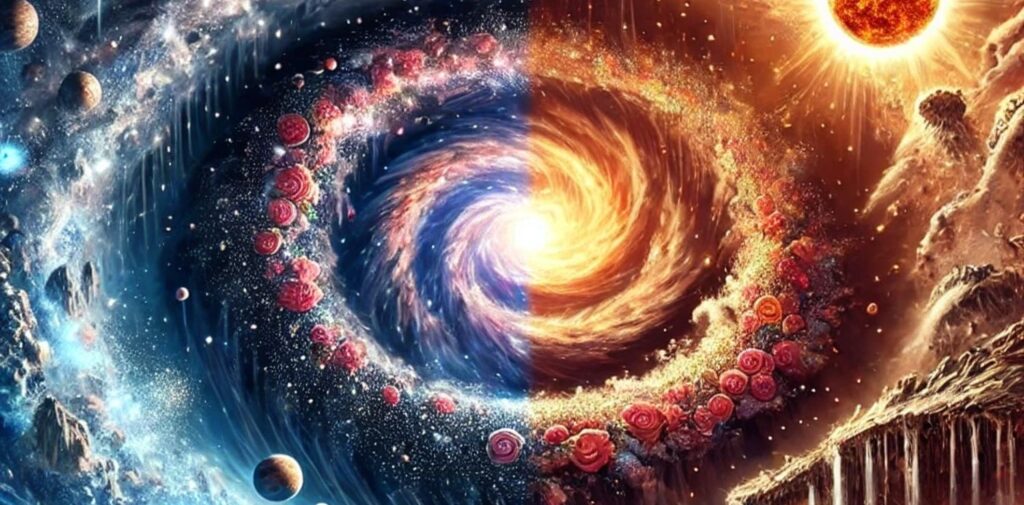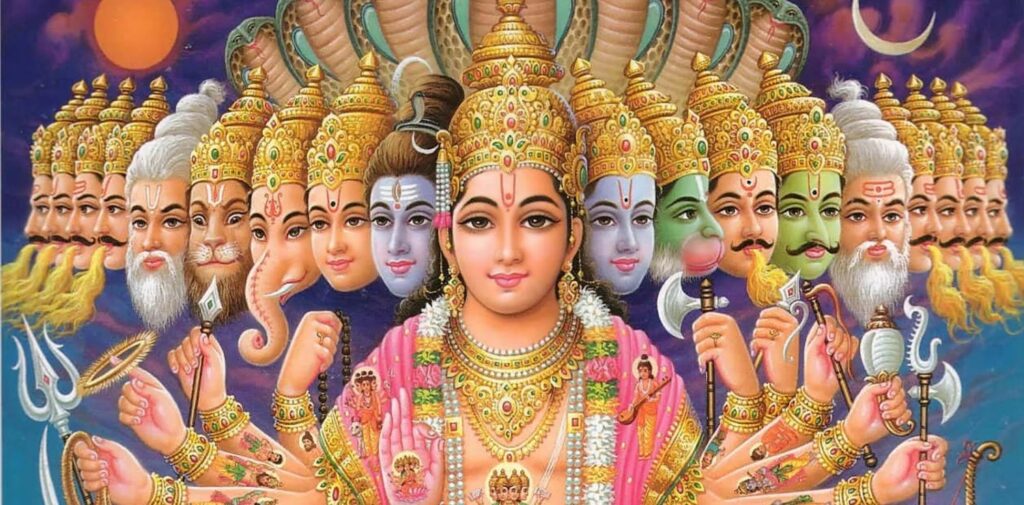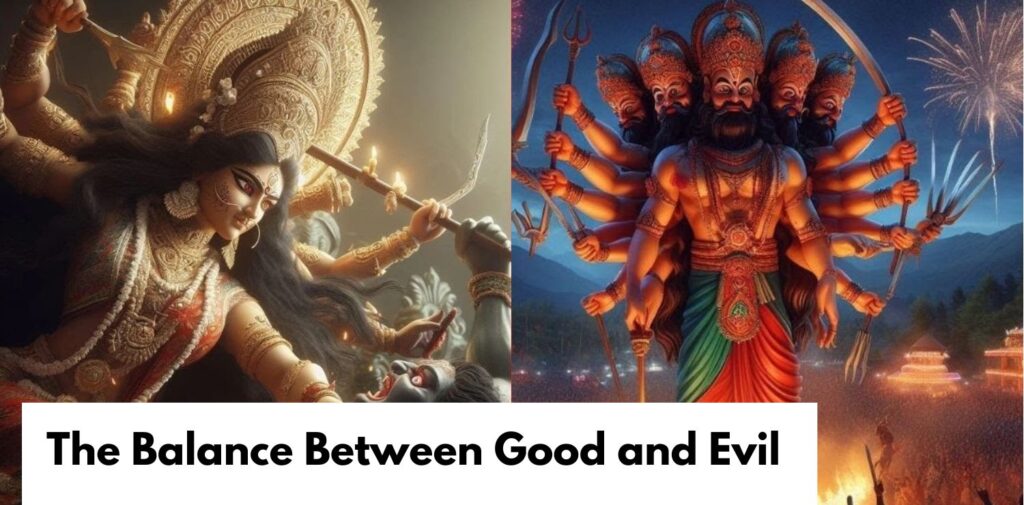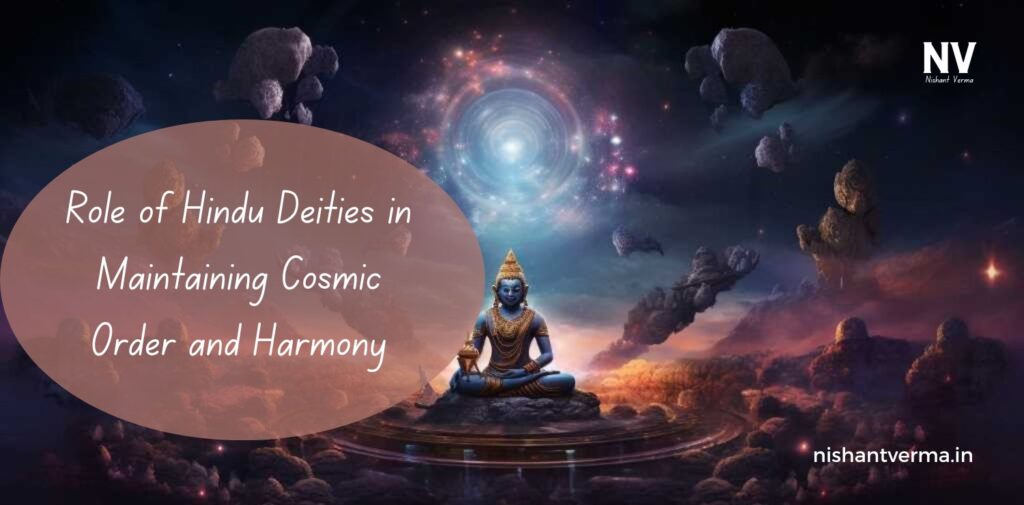Hinduism, one of the oldest and most diverse religions in the world, has a rich tapestry of stories, beliefs, and gods that explain the workings of the universe. Central to this religion is the idea of cosmic order, or “Rta”, which represents the natural laws that govern the universe. Hindu deities play a key role in upholding this order and ensuring that balance and harmony are maintained in the cosmos. These gods and goddesses, with their unique attributes and stories, work together to keep the universe in equilibrium, providing a spiritual framework for how life should be lived in harmony with nature and the divine.
In this article, we’ll explore how Hindu deities contribute to the maintenance of cosmic order and harmony, and how their roles are essential for the universe’s balance.

The Concept of Cosmic Order in Hinduism
To understand the role of Hindu deities in upholding cosmic order, we first need to know what cosmic order means in Hinduism. The term used for this concept is Rta, which refers to the moral and natural order that governs the universe. Everything in the world, from the cycles of nature to human actions, is believed to be governed by this universal law.
Rta is not just about physical balance; it also includes the moral and ethical order. It guides how individuals should live their lives, how society should function, and how the natural world should behave. When this order is disrupted, the world faces chaos and disorder, which is often symbolized by the forces of evil or adharma (unrighteousness). The Hindu gods and goddesses, through their divine actions, work to restore balance whenever it is disturbed.

Key Hindu Deities and Their Role in Upholding Cosmic Order
Hinduism has a vast array of gods and goddesses, each responsible for different aspects of life and the universe. However, some key deities play significant roles in ensuring the cosmic order is maintained.
Brahma – The Creator
Brahma is the god of creation in Hinduism. As the creator of the universe, his role is essential in the beginning stages of the cosmic order. According to Hindu belief, Brahma creates the world, all living beings, and the physical universe. Without Brahma’s creative power, there would be no world to sustain, and the balance of nature would cease to exist.
Brahma is not directly involved in maintaining the world once it is created. Instead, his creation is set in motion, and the universe is left to function according to the natural laws. But, without his initial creation, the cosmic order would never have come into being.
Vishnu – The Preserver
While Brahma is responsible for creation, Vishnu, the preserver, takes on the task of maintaining and protecting the cosmic order. Vishnu is often depicted as a calm and benevolent god who sustains the universe by keeping everything in balance. He is also associated with the idea of dharma, or righteous living, and acts as a protector of moral order.
Whenever the world is threatened by evil or chaos, Vishnu descends to Earth in various forms, known as avatars, to restore balance. Some of his famous avatars include:
- Matsya (the fish), who saved the sacred scriptures from a great flood.
- Rama, the prince who defeated the demon king Ravana to restore order.
- Krishna, who guided Arjuna during the Mahabharata and fought to preserve justice.
Vishnu’s role as the preserver is essential for the continuous functioning of the universe. By incarnating in different forms, Vishnu ensures that whenever dharma is at risk, it is revived, and cosmic harmony is restored.
Shiva – The Destroyer
In Hinduism, Shiva is the god of destruction, but this doesn’t mean destruction in a negative sense. Shiva’s role is to destroy in order to pave the way for renewal and regeneration. Destruction, in the Hindu worldview, is an essential part of the natural cycle of life, death, and rebirth. Just as the earth needs to be periodically cleaned and renewed, the universe too needs to be destroyed so that new life and creation can take place.
Shiva’s destruction is not chaotic or uncontrolled. It is a part of the cosmic cycle (often called Kalachakra) that keeps everything in balance. Through his destructive energy, Shiva allows for the old and unworthy to be destroyed, making way for the new and the good to emerge. In this way, Shiva’s role in cosmic order is to ensure that nothing remains stagnant or in a state of imbalance.
Durga – The Protector Against Evil
While Vishnu preserves the cosmic order, Durga, the goddess of power, protects the world from evil forces. She is often depicted riding a lion and wielding various weapons, symbolizing her strength and ability to destroy demons and forces that threaten the natural balance.
Durga’s most famous story is the defeat of the buffalo demon Mahishasura, who had gained power and threatened to disrupt the order of the world. Durga fought him in a fierce battle and ultimately restored balance and peace to the universe. Her role in upholding cosmic harmony is vital because she symbolizes the victory of good over evil, and her presence ensures that the natural order is protected from those who would bring chaos.
Ganesha – The Remover of Obstacles
Ganesha, the elephant-headed god, is worshipped by millions of Hindus before embarking on any new venture or journey. He is known as the remover of obstacles and is invoked to bring success, wisdom, and prosperity.
While Ganesha is not directly involved in the grand workings of the universe like Brahma, Vishnu, or Shiva, his role in human life is important for maintaining harmony at a personal level. By removing obstacles and helping individuals align their lives with dharma, Ganesha helps maintain balance on a smaller scale,which in turn contributes to the larger cosmic order.

The Balance Between Good and Evil
In Hinduism, the battle between good and evil is not seen as a constant struggle, but rather as a cycle of creation, preservation, and destruction. The gods, along with goddesses like Durga and Lakshmi, protect the world from asuras (evil beings) and restore harmony whenever it is disturbed.
The role of the deities in fighting evil is not just about defeating demons or enemies but about restoring dharma and ensuring that the world continues to function in a righteous manner. The balance between good and evil, order and chaos, is essential for the universe’s ongoing existence.
Conclusion
Hindu deities are not just figures of worship but powerful forces that maintain the cosmic order. Through their actions of creation, preservation, destruction, and protection, these gods ensure that the world remains in balance. Whether it’s Brahma’s creation of the world, Vishnu’s preservation of harmony, Shiva’s role in renewal through destruction, or Durga’s protection against evil, each deity has a vital function in keeping the universe in check.
Through their divine interventions, They maintain the natural laws of the universe, ensuring that the world continues to exist in harmony and balance. By understanding and respecting these forces, humans can live in alignment with the cosmic order and contribute to the maintenance of peace and harmony in their own lives.




